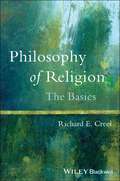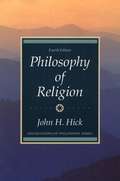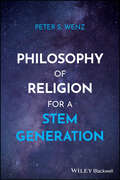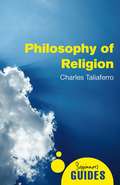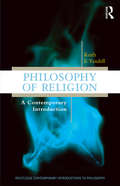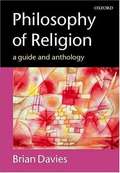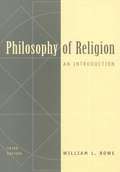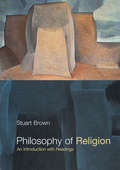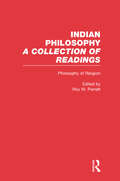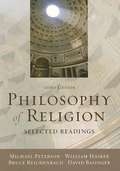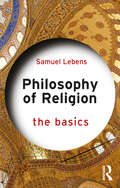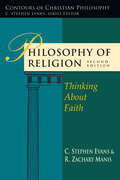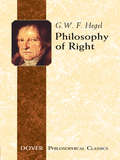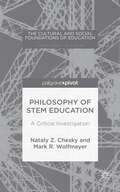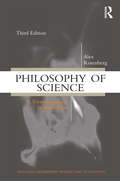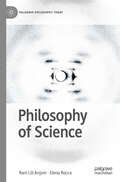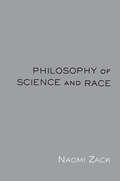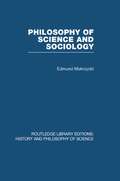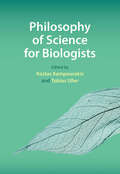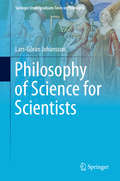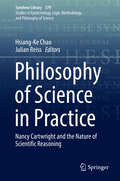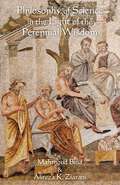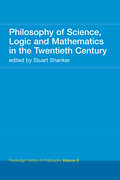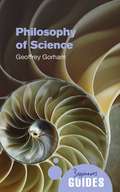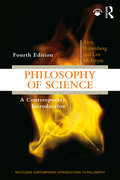- Table View
- List View
Philosophy of Religion
by Richard E. CreelPhilosophy of Religion: The Basics offers a concise introduction to philosophy of religion, distilling key discussions and concepts of the subject to their succinct essence, providing a truly accessible entry into the subject.A truly accessible introduction to philosophy of religion for beginnersTakes a topical approach, starting with the nature of religion and moving the reader through the major concepts, explaining how topics connect and point to one anotherOffers a thorough and full treatment of diverse conceptions of God, the ontological argument, and divine attributes and dilemmasA genuinely concise introduction, this text can be used alongside other resources without overtaxing studentsRepresents 30 years of experience teaching to undergraduatesIncludes a free downloadable file with key excerpts and additions to help students study
Philosophy of Religion (4th Edition)
by John H. HickRevision features an updated discussion on the main topics in the philosophy of religion: the concept of God - grounds for belief in God - ground for disbelief in God - the problem of evil - revelation and faith - problems of religious language - the conflicting falsifiability of religious assertions - the conflicting truth-claims of different religions - human destiny and more.
Philosophy of Religion for a STEM Generation
by Peter S. WenzA Fresh and Engaging Introduction to Philosophy of Religion for STEM Students Philosophy of Religion for a STEM Generation applies a new cross-disciplinary approach to the age-old questions of religion and science. Written by philosopher and educator Peter S. Wenz, this innovative textbook combines the rigor of scientific reasoning with the depth of theological inquiry, creating a unique bridge between STEM students and philosophy of religion. Using humor, pop culture, and personal narratives, Wenz considers philosophical questions surrounding the existence of God, the nature of the universe, free will, the problem of evil, and other key philosophical arguments. Fully integrating scientific theories and methods into discussions of traditional religious topics, the book not only considers the scientific worldview but also examines how science and theology can complement one another. Student-friendly chapters offer fascinating insights into how philosophical analysis and scientific evidence can converge while providing a balanced examination that makes complex ideas relatable and thought-provoking, without taking a stance on whether or not God actually exists. Philosophy of Religion for a STEM Generation is ideal for students in undergraduate Philosophy of Religion or Philosophy of Science courses, as well as all students seeking to understand religion’s role in a scientific world and explore life’s biggest questions at the intersection of science, faith, and philosophy.
Philosophy of Religion: A Beginner's Guide (Beginner's Guides #3)
by Charles TaliaferroWhy does evil exist? Could God could create a stone he couldn't lift? Does the wonder of life imply a creator? Philosophy of religion is concerned with such questions. Assuming no prior knowledge of philosophy, Taliaferro provides a clear exploration of the discipline, covering the key topics of morality and religion, evil, the afterlife, prayer, and miracles. Also containing a section dedicated to Hinduism, Buddhism and the Eastern religions, this helpful primer is the perfect resource for students or the general reader. Charles Taliaferro is Professor of Philosophy at St. Olaf College, Minnesota, USA. He is the author or editor of numerous books on the philosophy of religion including as co-editor of The Blackwell Companion to Philosophy of Religion.
Philosophy of Religion: A Contemporary Introduction (Routledge Contemporary Introductions to Philosophy)
by Keith E. YandellKeith Yandell's Philosophy of Religion: A Contemporary Introduction was one of the first textbooks to explore the philosophy of religion with reference to religions other than Christianity.?This new, revised edition explores the logical validity and truth claims of several world religions—Christianity, Judaism, Islam, Hinduism, Buddhism, and Jainism—with updated, streamlined discussions on important topics in philosophy of religion such as: Religious pluralism Freedom and responsibility Evidentialist Moral Theism Reformed Epistemology Doxastic Practice Epistemology The problem of evil Ontological and cosmological arguments Other new features include updated Questions for Reflection,and new Annotated Bibliographies for each chapter, as well as an updated Glossary. This exciting new edition, much like its classic predecessor, is sure to be a classroom staple for undergraduate students studying philosophy of religion, as well as a comprehensive introductory read for anyone interested in the subject.
Philosophy of Religion: A Guide and Anthology
by Brian DaviesPhilosophy of Religion: A Guide and Anthology provides a comprehensive, authoritative, and accessible overview of the philosophy of religion. Under the careful editorship of Brian Davies, the book contains a selection of the best classical and contemporary writings on the philosophy of religion together with substantial commentary, introductory material, discussion questions, and detailed guides to further reading. The editorial material sets the extracts in context and guides the readerthrough them. Taken as a whole, the book offers the ideal, self-contained introduction to the questions which have most preoccupied Western philosophers when thinking about religion. The selection is both very comprehensive and very generous. 65 sizeable extracts map out the full range of topics most commonly encountered in courses on the philosophy of religion. Part I looks at the relation between philosophy and religious belief; Parts II-IV consider the existence and nature of God; Part Vaddresses the 'problem of evil'; and Parts VI and VII are devoted to the relationship between morality and religion and to the question of life after death.
Philosophy of Religion: An Introduction
by William L. RoweThird Edition: It is reasonably clear that the arguments for the existence of God will continue to receive serious attention.
Philosophy of Religion: An Introduction with Readings (Philosophy and the Human Situation)
by Stuart BrownWith the entry-level student in mind, Stuart Brown guides the reader through three main topics: whether or not there is life after death; whether or not there is a powerful, beneficent intelligence controlling the universe; and the nature and appropriate defence of religious belief or faith. Each chapter is linked to readings by commentators on religion and belief, such as David Hume, John Hick, Richard Dawkins and William James. Key features also include activities and exercises, chapter summaries and guides to further reading.
Philosophy of Religion: Indian Philosophy (Indian Philosophy Ser. #Vol. 4)
by Roy W. PerrettFirst Published in 2001. Routledge is an imprint of Taylor & Francis, an informa company.
Philosophy of Religion: Selected Readings
by William Hasker Michael Peterson Bruce Reichenbach David BasingerThe new edition of this perennially popular anthology in the philosophy of religion examines both basic classical concepts and a host of contemporary issues. Organized into fourteen thematic sections, Philosophy of Religion presents seventy-three selections that cover standard subjects--religious experience, theistic arguments, the problem of evil, and miracles--as well as more recent topics including reformed epistemology, process theism, the kalam theological argument, the religion-science controversy, religious ethics, and the diversity of world religions. The third edition adds two new sections--on the ontological status of religion and open theism--along with helpful study questions and a glossary. It also features revised and expanded section introductions and updated suggestions for further reading. While it deals primarily with the Western and analytic traditions in philosophy, Philosophy of Religion, Third Edition, also incorporates readings representing continental, feminist, and Asian perspectives. New selections include essays by Marilyn McCord Adams, Robert Merrihew Adams, David Basinger, Emile Durkheim, C. Stephen Evans, J. R. Lucas, Bruce Reichenbach, and Jean-Paul Sartre. An ideal stand-alone textbook for courses in the philosophy of religion, this volume is also readily compatible for use as a primary source reader in conjunction with a secondary text.
Philosophy of Religion: The Basics (The Basics)
by Samuel LebensThis book introduces students and other interested readers to the philosophy of religion—a vibrant and growing field of academic philosophy. Readers will be guided through an exploration of classic and contemporary arguments for and against theism. In addition to this crucial, but standard fare, this book looks to probe deeper into the nature and value (or dis-value) of religion itself. Philosophy of religion is becoming more diverse, both in terms of the religious traditions it examines, and the issues that it addresses. This book reflects that fact, engaging with religious traditions from Quakerism to Jainism. Questions and topics covered include: What is religion? What philosophical problems arise for the practices of prayer, worship, and meditation? How might multiple religions co-exist in peace? If there’s a God, would it be the sort of thing that language could describe? When and how might it be rational to wager that a particular religion is true? With a glossary of key terms and suggestions for further reading, Philosophy of Religion: The Basics is an ideal starting point for anyone seeking a lively and accessible foray into the study of religion or philosophy.
Philosophy of Religion: Thinking About Faith (Contours of Christian Philosophy)
by C. Stephen Evans R. Zachary ManisAdd this ebook to your cart, purchase it and download it immediately in any or all of these formats: PDF.Philosophy of Religion
Philosophy of Right
by G. W. Hegel S. W. DydeComplete and unabridged, this edition of Georg Wilhelm Friedrich Hegel's 1821 classic offers a comprehensive view of the philosopher's influential system. In the Philosophy of Right, Hegel applies his most important concept--the dialectics--to law, rights, morality, the family, economics, and the state. The last of Hegel's works to be published in his lifetime, this volume combines moral and political philosophy to form a sociologic view dominated by the idea of the state. Hegel defines universal right as the synthesis between the thesis of an individual acting in accordance with the law and the occasional conflict of an antithetical desire to follow private convictions. The state, he declares, must permit individuals to satisfy both demands, thereby realizing social harmony and prosperity--the perfect synthesis. Further, Hegel renounces his formerly favorable assessment of the French Revolution and rejects the republican form of government, suggesting instead an idealized form of a constitutional monarchy, in which ultimate power rests with the sovereign.
Philosophy of STEM Education: A Critical Investigation
by Nataly Z. Chesky Mark R. WolfmeyerFramed as educational equality initiatives that will help students gain the knowledge they need to compete in the global marketplace, STEM may be the most indicative educational reform discourse of our time and has grown to become one of the primary foci of educational policy, in part due to association with a wide array of today's industries: from information and communications technology to the medical field, to sustainability innovations. This book's primary focus is to shift the attention away from such utilitarian aims and ask critical questions about what aims the STEM initiatives are asking for and what assumptions do they hold about both teaching STEM and the nature of STEM content. In order to answer the above questions, the authors use a philosophical lens to study STEM policies as a political and social phenomenon.
Philosophy of Science
by Alex RosenbergAny serious student attempting to better understand the nature, methods and justification of science will value Alex Rosenberg's updated and substantially revised Third Edition of Philosophy of Science: A Contemporary Introduction. Weaving together lucid explanations and clear analyses, the volume is a much-used, thematically oriented introduction to the field. New features of the Third Edition include more coverage of the history of the philosophy of science, more fully developed material on the metaphysics of causal and physical necessity, more background on the contrast between empiricism and rationalism in science, and new material on the structure of theoretical science (with expanded coverage of Newtonian and Darwinian theories and models) and the realism/antirealism controversy. Rosenberg also divides the Third Edition into fifteen chapters, aligning each chapter with a week in a standard semester-long course. Updated Discussion Questions, Glossary, Bibliography and Suggested Readings lists at the end of each chapter will make the Third Edition indispensable, either as a comprehensive stand-alone text or alongside the many wide-ranging collections of articles and book excerpts currently available. Read our interview with Alex Rosenberg, What exactly is philosophy of science - and why does it matter? here: www.routledge.com/u/alexrosenberg
Philosophy of Science (Palgrave Philosophy Today)
by Rani Lill Anjum Elena RoccaThis textbook is a comprehensive, engaging, and user-friendly introduction to philosophy of science written by a philosopher and a scientist. By exploring traditional debates within philosophy of science, as well as analysing contemporary scientific controversies for philosophical bias, the reader is invited to reflect upon how philosophical assumptions influence scientific theory, methods, and practice. Key features: Is an accessible introduction to philosophy of science written by a philosopher and a scientist. Includes some of the many important contributions from women philosophers and scientists. Demonstrates the philosophical influences on scientific thinking, practice, and expert disagreement. Applies philosophy of science to analyse some specific real-life cases of scientific controversy. This book is an essential resource for students and teachers in philosophy of science. It is also ideal for anyone interested in the philosophical influences on contemporary science.
Philosophy of Science and Race
by Naomi ZackFirst published in 2003. Routledge is an imprint of Taylor & Francis, an informa company.
Philosophy of Science and Sociology: From the Methodological Doctrine to Research Practice (Routledge Library Editions: History & Philosophy of Science)
by Edmund MokrzyckiOriginally published in 1983. This book concentrates on the impact of philosophy of science on sociology and other disciplines. It argues that the impact of the philosophy of science on sociology from the rise of the Vienna Circle until the mid-1980s resulted in a deep-reaching and, in the author’s view, undesirable methodological reorientation in sociology.
Philosophy of Science for Biologists
by Kostas Kampourakis Tobias UllerBiologists rely on theories, apply models and construct explanations, but rarely reflect on their nature and structure. This book introduces key topics in philosophy of science to provide the required philosophical background for this kind of reflection, which is an important part of all aspects of research and communication in biology. It concisely and accessibly addresses fundamental questions such as: Why should biologists care about philosophy of science? How do concepts contribute to scientific advancement? What is the nature of scientific controversies in the biological sciences? Chapters draw on contemporary examples and case studies from across biology, making the discussion relevant and insightful. Written for researchers and advanced undergraduate and graduate students across the life sciences, its aim is to encourage readers to become more philosophically minded and informed to enable better scientific practice. It is also an interesting and pertinent read for philosophers of science.
Philosophy of Science for Scientists
by Lars-Göran JohanssonThis textbook offers an introduction to the philosophy of science. It helps undergraduate students from the natural, the human and social sciences to gain an understanding of what science is, how it has developed, what its core traits are, how to distinguish between science and pseudo-science and to discover what a scientific attitude is. It argues against the common assumption that there is fundamental difference between natural and human science, with natural science being concerned with testing hypotheses and discovering natural laws, and the aim of human and some social sciences being to understand the meanings of individual and social group actions. Instead examines the similarities between the sciences and shows how the testing of hypotheses and doing interpretation/hermeneutics are similar activities. The book makes clear that lessons from natural scientists are relevant to students and scholars within the social and human sciences, and vice versa. It teaches its readers how to effectively demarcate between science and pseudo-science and sets criteria for true scientific thinking. Divided into three parts, the book first examines the question What is Science? It describes the evolution of science, defines knowledge, and explains the use of and need for hypotheses and hypothesis testing. The second half of part I deals with scientific data and observation, qualitative data and methods, and ends with a discussion of theories on the development of science. Part II offers philosophical reflections on four of the most important concepts in science: causes, explanations, laws and models. Part III presents discussions on philosophy of mind, the relation between mind and body, value-free and value-related science, and reflections on actual trends in science.
Philosophy of Science in Practice
by Hsiang-Ke Chao Julian ReissThis volume reflects the 'philosophy of science in practice' approach and takes a fresh look at traditional philosophical problems in the context of natural, social, and health research. Inspired by the work of Nancy Cartwright that shows how the practices and apparatuses of science help us to understand science and to build theories in the philosophy of science, this volume critically examines the philosophical concepts of evidence, laws, causation, and models and their roles in the process of scientific reasoning. Each chapter is an important one in the philosophy of science, while the volume as a whole deals with these philosophical concepts in a unified way in the context of actual scientific practice. This volume thus aims to contribute to this new direction in the philosophy of science.
Philosophy of Science in the Light of the Perennial Wisdom
by Mahmoud Bina Alireza K. ZiaraniBacked by its technological achievements, modern science appears as the de facto source of truth to the majority of our contemporaries. Its sole reliance on reason and empirical data gives it an air of objectivity that has conferred upon it an almost unquestioning authority. Against the backdrop of this pervasive scientism, Philosophy of Science in the Light of the Perennial Wisdom is a daring attempt to offer an intellectual critique of modern science in its foundation by rigorously examining the intrinsic limitations of rational thought and empirical investigation. Unique of its kind, this book offers a refreshing look at the traditional doctrines of epistemology and metaphysics as an antidote to the subjective as well as objective errors of modern science, which is thus revealed as no more than a belief system that falls radically short of offering a full knowledge of reality; this, in contrast to the perennial wisdom of the world's great religions that for millennia have offered humankind not only keys to true knowledge, but also the means of attaining it, which precisely constitutes man's reason for being.
Philosophy of Science, Logic and Mathematics in the 20th Century: Routledge History of Philosophy Volume 9
by Stuart G. ShankerThe twentieth century witnessed the birth of analytic philosophy. This volume covers some of its key movements and philosophers, including Frege and Wittgenstein's Tractatus.
Philosophy of Science: A Beginner's Guide (Beginner's Guides #20)
by Geoffrey GorhamSo the world didn't end on 10 September 2008, but the possibility may have got you thinking. Examining core philosophical issues facing scientists, Geoffrey Gorham probes such controversial issues as the Large Hadron Collider, intelligent design, the prospect of human extinction, space colonization, and much more. Geoffrey Gorham is Assistant Professor in Philosophy at the University of Wisconsin-Eau Claire.
Philosophy of Science: A Contemporary Introduction (Routledge Contemporary Introductions to Philosophy)
by Alex Rosenberg Lee McIntyreAny serious student attempting to better understand the nature, methods, and justification of science will value Alex Rosenberg and Lee McIntyre’s updated and substantially revised fourth edition of Philosophy of Science: A Contemporary Introduction. Weaving lucid explanations with clear analyses, the volume is a much- used, thematically oriented introduction to the field. The fourth edition has been thoroughly rewritten based on instructor and student feedback, to improve readability and accessibility, without sacrificing depth. It retains, however, all of the logically structured, extensive coverage of earlier editions, which a review in the journal Teaching Philosophy called “the industry standard” and “essential reading.” Key Features of the Fourth Edition: Revised and rewritten for readability based on feedback from student and instructor surveys. Updated text on the problem of underdetermination, social science, and the realism/antirealism debate. Improved continuity between chapters. Revised and updated Study Questions and annotated Suggested Readings at the end of each chapter. Updated Bibliography. For a list of relevant online primary sources, please visit: www.routledge.com/9781138331518.
